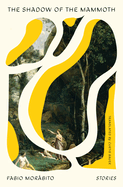
Connections--desired, attempted, disregarded, missed--loom throughout Fabio Morábito's outstanding 18-story sophomore collection, The Shadow of the Mammoth, reprising similar themes found in Mothers and Dogs (2023). Once again, poet/academic Curtis Bauer adroitly translates.
Tunnels are literal links, although their manifestation has unexpected results in five stories. In "The Great Floating World," the construction of a "floating highway, made up of fifteen tunnels" causes significant deaths, including a royal demise. A tunnel-like trash chute brings neighbors together in "Time to Take Out the Trash." In "Wildlife Crossing," an under-the-airport passageway for animals becomes a satiating haven for an aging lion--and an international point of contention for humans. In "Daedalus Under Berlin," masons construct tunnels intended as deathtraps for escapees fleeing to the West from the East. A birthday tortoise comes to symbolize the "The Mont Blanc Tunnel," inspired by two tunnel workers' "sturdy friendship."
Translations are also meant to connect--but don't. Translation doesn't bridge languages so much as cause miscommunication in "The Sadness of Translation" and "Letters to the Queen." In the concluding titular story, Morábito juxtaposes two distinct narratives--a prehistoric cave painter who's also a polyglot tribal mediator and a contemporary middle-aged translator in a seventh-floor apartment--which slyly seems to require readers to personally establish potential linkage.
Morábito--his own Egypt-born, Italy-raised, Mexico-domiciled history a peripatetic patchwork--creates in-between, elliptical spaces from which he provokes his characters' (and readers') reactions. Whether by concrete or ethereal means (blank wall space, sleep, dark waters), Morábito continues to probe, searching for opportunities to make contact and possibly, hopefully, momentarily touch. --Terry Hong

